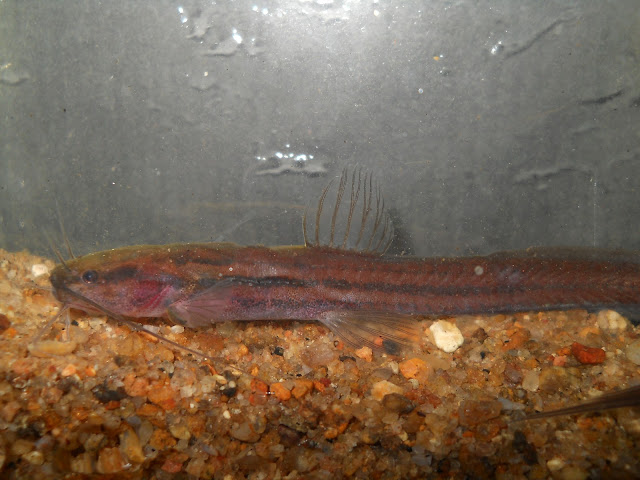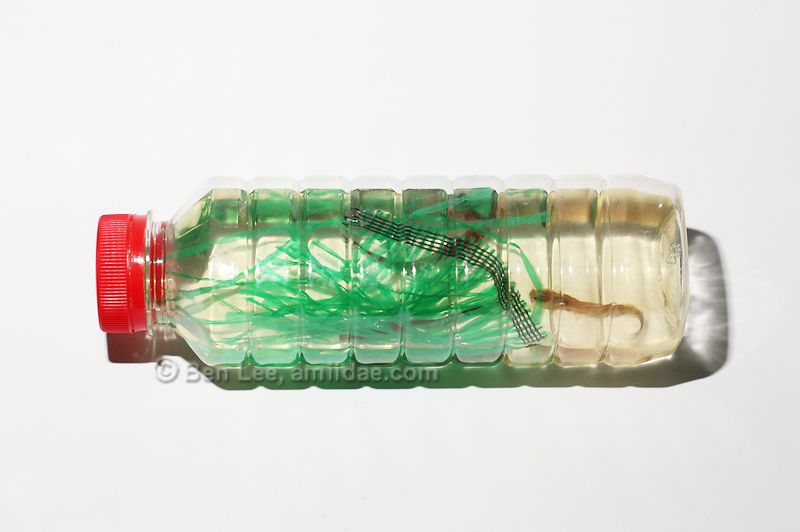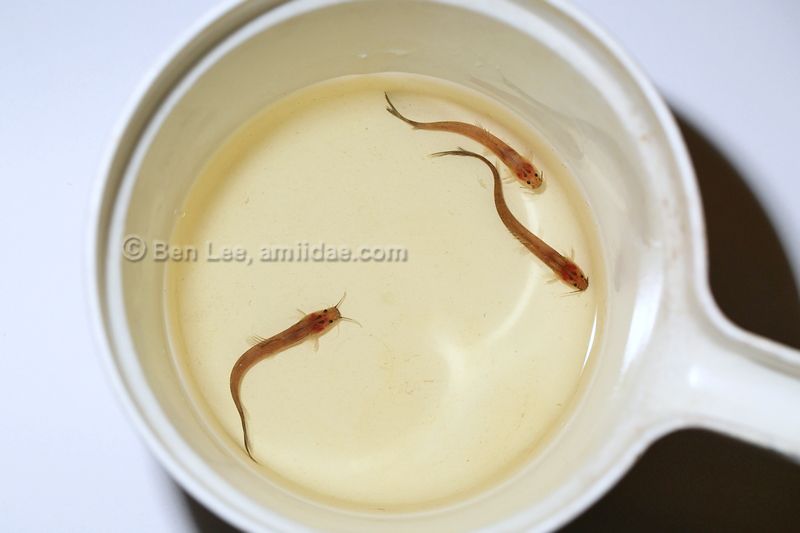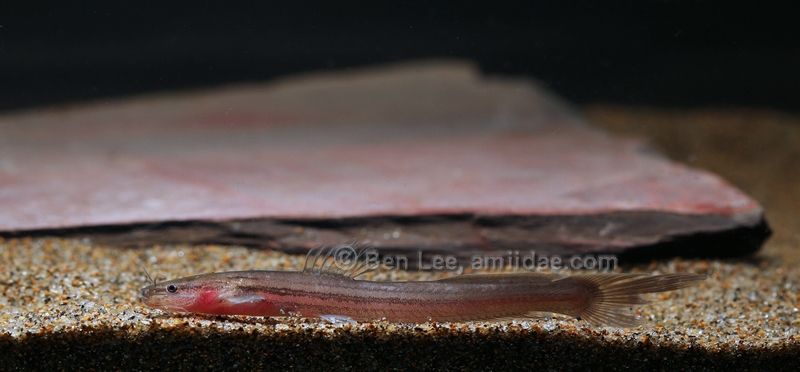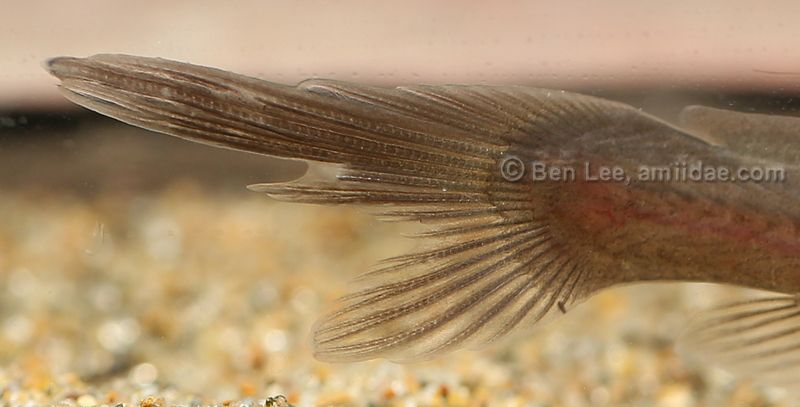Page 1 of 1
Indian Olyra
Posted: 10 Jan 2012, 18:19
by Shovelnose

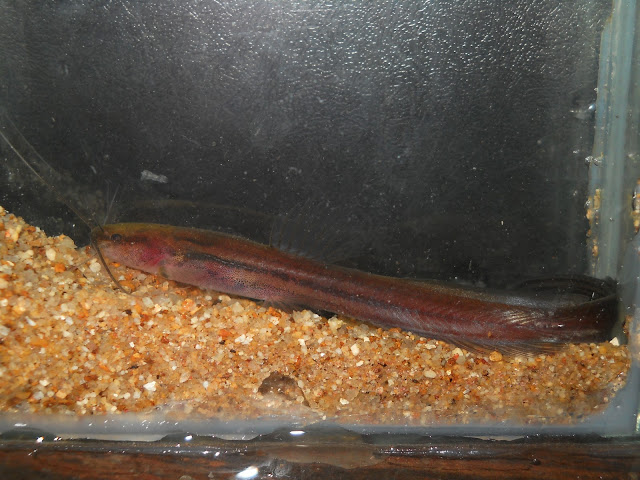
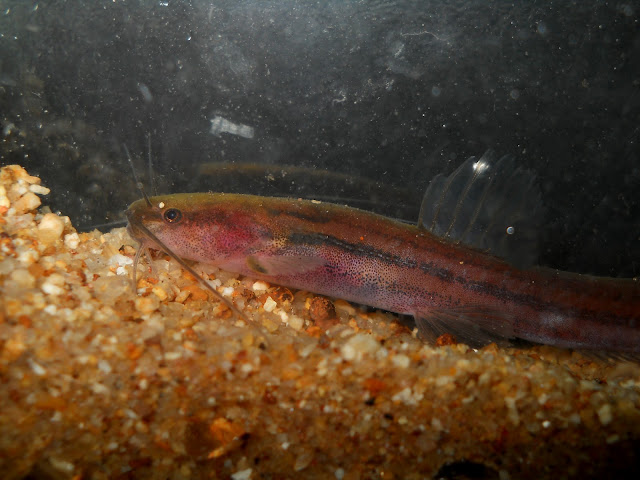
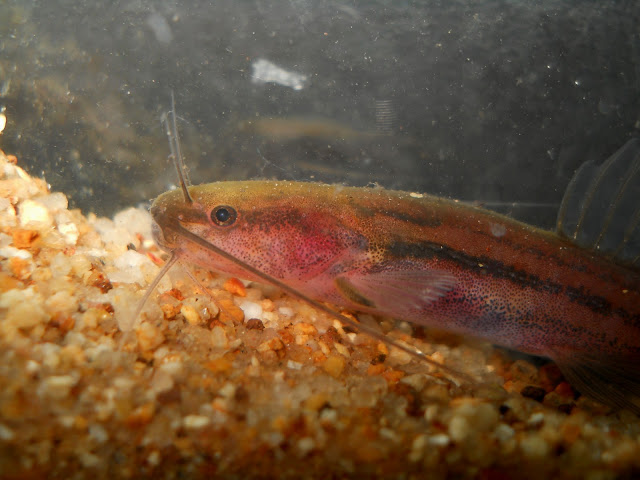
. Keeping this for the second time. Managed to keep one specimen alive alone in a 2 foot tank a few years ago but lost it to summer eventually.
I am keeping this specimen in a community hill stream tank. Food is tubifex,blood worms,prawns and FBS (all spot fed).
Any other species in the trade yet???
Re: Indian Olyra
Posted: 11 Jan 2012, 12:17
by Richard B
I've seen fish labelled Olyra a few times but not many. Often they are Amblyceps or something other than Olyra.
BAS had some Olyra that were longicaudata or something very similar but they were mostly hiding in the tank and were very dark specimens.
Wildwoods had a couple of individual fish labelled fighting catfish which looked very much like olyra but were 'chunky' 4" fish but i didn't pay much attention to them at the time.
Re: Indian Olyra
Posted: 11 Jan 2012, 12:53
by Silurus
I saw a bag of O. burmanica at an exporter here a long time (>10 years) ago. They had beaten each other up quite badly (all of them had part or almost all of the caudal fin missing), along with some Amblyceps kurzii that was inside the bag as contaminants.
Re: Indian Olyra
Posted: 11 Jan 2012, 16:08
by Shane
Like HH, I remember them coming in over 10 years ago as "Asian fighting catfish." Unfortunately I never got my hands on any.
-Shane
Re: Indian Olyra
Posted: 11 Jan 2012, 17:04
by Shovelnose
I am currently keeping these with some
Amblyceps cerinum and
Amblyceps mangois. I haven't seen any fights as yet. Hopefully it stays this way.
There is a
STUNNING black specimen represented (as
O.horae IFIRC) in the book, "The Ornamental Aquarium Fish of India". I don't have the book unfortunately. I will try to get some scanned images soon.
Silurus wrote:I saw a bag of O. burmanica at an exporter here a long time (>10 years) ago. They had beaten each other up quite badly (all of them had part or almost all of the caudal fin missing), along with some Amblyceps kurzii that was inside the bag as contaminants.
Is there any way to identify
Olyra spp. externally??? Also,what do you think of the "
Myoglanis collettii is actually an
Olyra" issue HH???
Ps : Hora Fighting Catfish is quite a funny trade name me thinks.
Re: Indian Olyra
Posted: 11 Jan 2012, 20:33
by medaka
HI Balaji
There is a STUNNING black specimen represented (as O.horae IFIRC) in the book, "The Ornamental Aquarium Fish of India". I don't have the book unfortunately.
If this is the book by KIshori Lal Tekriwal & Andrew Arunava Rao. ? Beware:-
IMHO this book is not a good example to identify fish from. Some of the photographic imagery have been mis-identified.
One example being the top photograph on page 107 which shows a photograph of Pseudolaguvia ribeiroi being labelled as "Elongated Moth Catfish Hara horai (Misra) 1950" and there are more erroneous identifications as you continue to look through it.

Re: Indian Olyra
Posted: 12 Jan 2012, 04:56
by Shovelnose
Hey Adrian,
I was primarily referring to the specimen picture. I have no way of knowing if the ID is correct.
You have kept O.longicaudata right??? Did it ever take anything other than live food???
Re: Indian Olyra
Posted: 12 Jan 2012, 11:09
by Laguviashawi
As a coauthor of the book Ornamental Aquarium Fish of India I publicly admit to mistakes in identification of some fish and naming certain undescribed species prematurely.
However, one must honestly appreciate the fact that this was the very first book on Indian Native fish which depicted live color pics and provided some insight on their characteristics.
This book was published in 1999 when the internet was not in vogue as it is today. The authors had to contend with available and accessible material most of which ZSI publications for aid in identification.
Adrian / Medaka has very harshly used the word "beware" for people intending to refer this book. He has given the example of the catfish species wrongly labeled as Hara horai and not Pseudolaguvia riberoi but with all the resources of modern scientific literature at his disposal via the internet he cannot make out the difference between a riberoi and a flavida.
Mistakes are mistakes wether intended or not but out of the 222 species of native Indian fish there are 13 mis identifications which is 6% and not really bad for a first venture by an aquarist and certainly does not warrant the tag rendered to this book by Adrian / Medaka
Regards
Andrew
Re: Indian Olyra
Posted: 12 Jan 2012, 12:06
by Richard B
Andrew - your points and explanations are logical and i'm sure no offence was mean't; after all many many books contain misidentifications - some that even i can see. Even recent publications like Seegars catfishes of Africa.
I belive the point trying to be made is that when looking at unusual species in books (whatever they may be) we need to be aware that sometimes identifications are not accurate.
Re: Indian Olyra
Posted: 12 Jan 2012, 12:27
by The.Dark.One
Welcome Andrew
All books (including scientific publications) have misidentifications in them. Your book was a welcome publication on what was before then (and to a degree, still is) a region in the world where books with colour pictures of wild fish are scarce. We all misidentify fish from time to time, especially when using photographs. I'm sure Adrian meant no offence.
Your efforts in the field have led to many new or rediscovered species and your book kick started a real interest in the fishes of the region.
Re: Indian Olyra
Posted: 12 Jan 2012, 14:56
by medaka
Adrian / Medaka has very harshly used the word "beware" for people intending to refer this book.
Appologies Andrew, maybe I should have chosen my words more carefully, and is stead of using "Beware" I should have used "Be aware of" as I did not mean anything maliciously
Adrian
Re: Indian Olyra
Posted: 12 Jan 2012, 15:47
by medaka
HI Balaji
Yes, I have kept O lngicaudata, quite a few years ago probably around the time that there seemed an influx of these into the hobby. If I remember correctly my LFS at the time got hold of 6 of these. They were not all that big, and the guy didn't know what he had, and the fish looked in poor shape. I took home 2 and housed them seperately, It seemed to me that they did not eat any of the flake, granular or tablet food that were being fed to their tank mates, so I started to feed live and frozen food. After a few months I gave one away to a friend, only to find a week later the other one dried up on the floor in my fish house one morning, it had somehow managed to get itself out of the tank through quite a small gap in the cover glass. ARGH!!!!
There is an article on these in the Catfish of the month for December 2008.
Re: Indian Olyra
Posted: 15 Jan 2012, 09:40
by Laguviashawi
Thank You Adrian
Thanks to Richard and Steve too
Apologies Balaji for hijacking your thread.
Great pics and portrayal of this little known genus.
Warm regards All and Best Wishes for the New Year
Andrew
Re: Indian Olyra
Posted: 16 Jan 2012, 15:44
by Shovelnose
Hey Andrew,
As Steve has pointed out, your book introduced many a species that were unknown to hobbyists (even in India) and some are still known only from pics in the book. I unfortunately wasn't much of a hobbyist until 2007 and hence, missed out on buying this book. I must really nick a copy from you the next time I am there.
Ps : I am sure I am not alone in asking for a Part 2.

Re: Indian Olyra
Posted: 16 Jan 2012, 15:49
by Shovelnose
medaka wrote:HI Balaji
Yes, I have kept O lngicaudata, quite a few years ago probably around the time that there seemed an influx of these into the hobby. If I remember correctly my LFS at the time got hold of 6 of these. They were not all that big, and the guy didn't know what he had, and the fish looked in poor shape. I took home 2 and housed them seperately, It seemed to me that they did not eat any of the flake, granular or tablet food that were being fed to their tank mates, so I started to feed live and frozen food. After a few months I gave one away to a friend, only to find a week later the other one dried up on the floor in my fish house one morning, it had somehow managed to get itself out of the tank through quite a small gap in the cover glass. ARGH!!!!
There is an article on these in the Catfish of the month for December 2008.
Ah. Bad luck!!! The tank gets both live and processed food but I am not planning to try pellets for this fish as prawn and blood worms are eaten quite greedily. I think the one I have is an almost full sized specimen. I wonder if they are aggressive enough to kill other specimens.
Re: Indian Olyra
Posted: 16 Jan 2012, 17:17
by The.Dark.One
Yes, part 2 please!
Re: Indian Olyra
Posted: 27 Apr 2012, 14:40
by Shovelnose
Re: Indian Olyra
Posted: 16 Apr 2013, 02:26
by Shovelnose
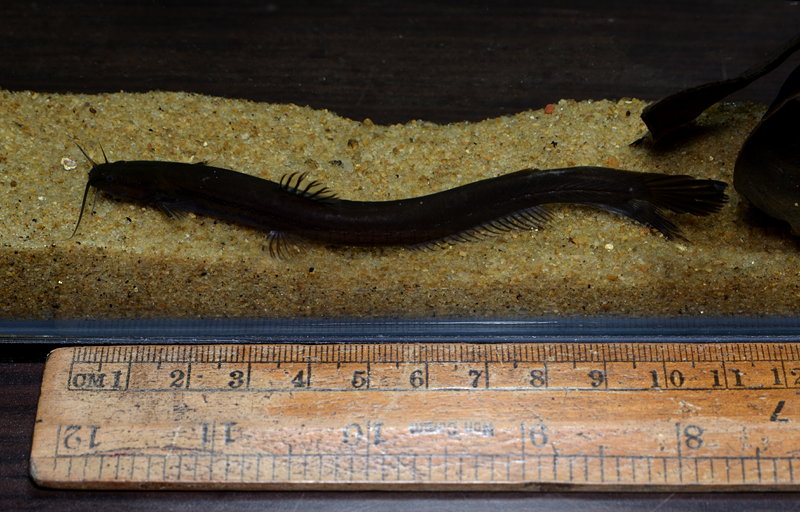
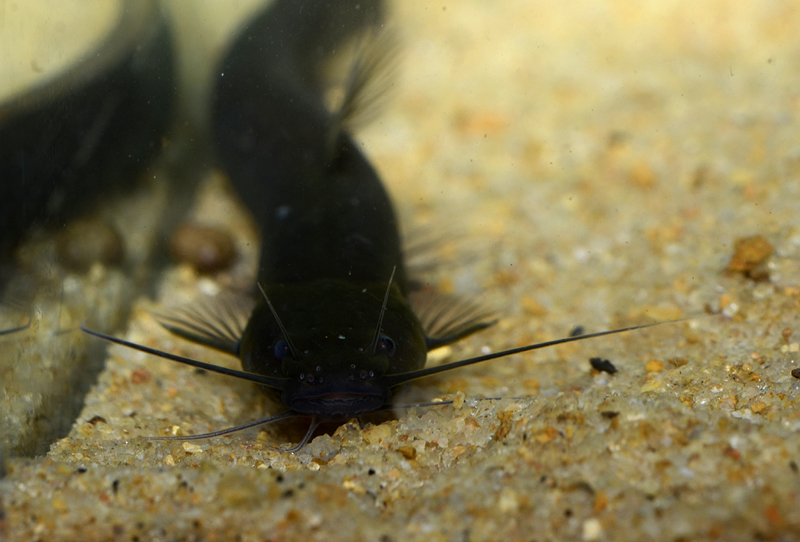
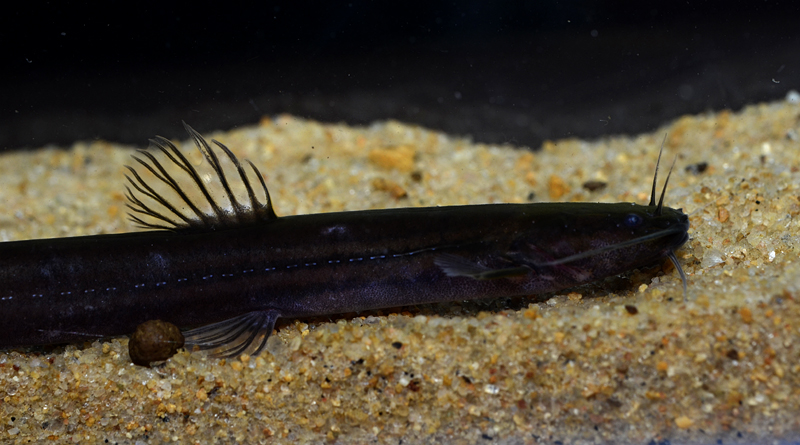
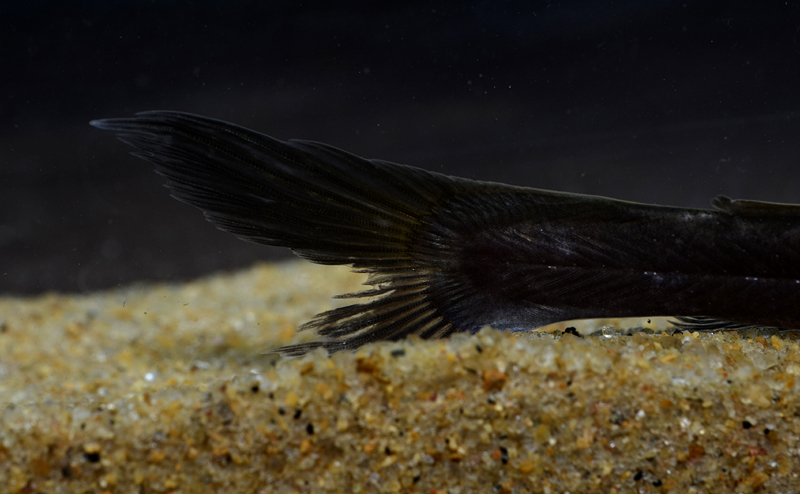
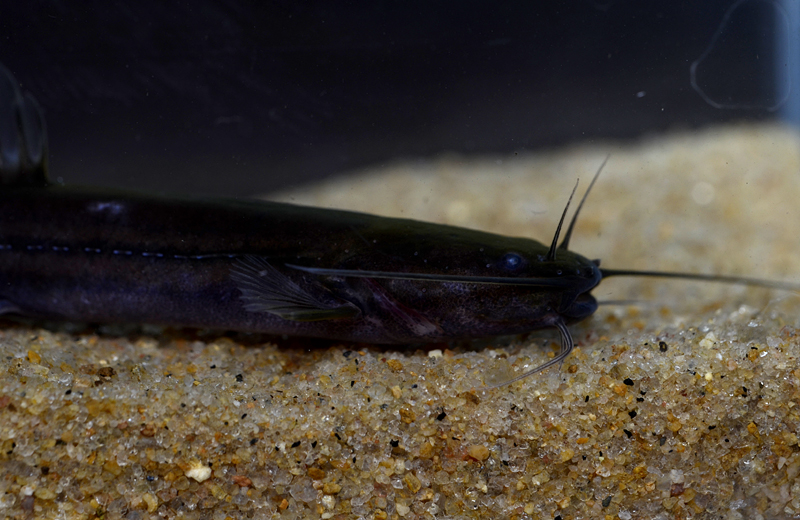
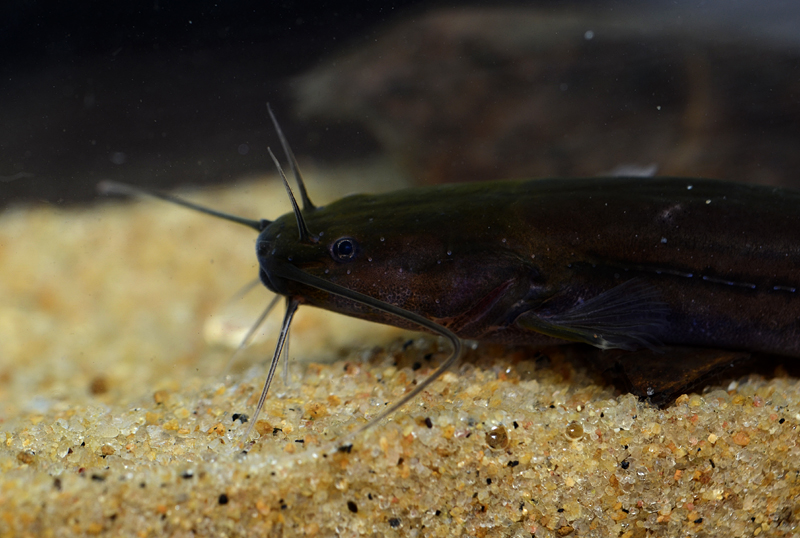
Pictures : Nilanjan
Olyra Sp. from the northern part of West Bengal. I have three of these cracking fish swimming around in my tanks now, and they are
incredibly nasty to each other.
HH,when Rahul and me were discussing the identity of this fish, we realised that
O.longicaudata was described as a fish with a lanceolate caudal fin. Could it be that the specimens with the elongated upper lobe in the trade are actually
O.kempi or another species???
Re: Indian Olyra
Posted: 11 May 2013, 10:08
by amiidae
Thanks to Andrew.

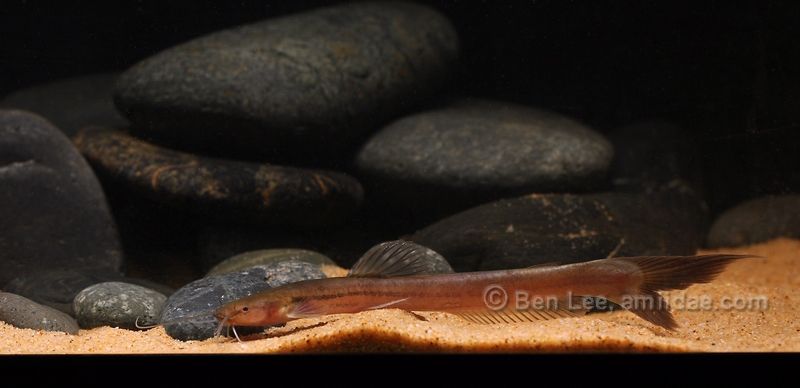
Re: Indian Olyra
Posted: 12 May 2013, 07:57
by Shovelnose
Great to see more of these specimens out!!!! I gave two specimens away as they were ridiculously aggressive. As regards to care, I treat them in the same manner as any other hillstream catfish (cold water,good DO,lots of pebbles and rocks strewn around) but with a little less current as they seemed a bit uncomfortable with strong currents. Your setup seems perfect

. Luckily for me,these fish take to pelleted food almost immediately.
Re: Indian Olyra
Posted: 12 May 2013, 08:25
by amiidae
Thanks for the info.
I will continue to try pellets. She took some bloodworm this morning.
btw, whats your tank water pH ?
Re: Indian Olyra
Posted: 12 May 2013, 09:17
by Shovelnose
To be frank, I haven't checked my water in a long time. I will check my old records if possible, although, I do remember the pH being on the higher side.
Re: Indian Olyra
Posted: 10 Jun 2013, 09:44
by drako57
Beautiful fish ! Where did you get this one ?
Re: Indian Olyra
Posted: 10 Jun 2013, 15:12
by Shovelnose
These specimens were from Darjeeling.
Re: Indian Olyra
Posted: 11 Nov 2013, 12:52
by amiidae
Re: Indian Olyra
Posted: 11 Nov 2013, 14:47
by Shovelnose
I haven't seen the original description of O.longicaudata but subsequent papers by Day (The fishes of India : being a natural history of the fishes known to inhabit the seas and fresh waters of India, Burma and Ceylon / by Francis Day and Fishes. By Francis Day) mention that this is a species with "the middle rays of the caudal prolonged to a lengthy point" and "lanceolate caudal fin" respectively. This makes me wonder if what we know as O.longicaudata in the trade, is actually another species.
Re: Indian Olyra
Posted: 12 Nov 2013, 12:07
by amiidae
Quite hard to imagine species under the same genus but with diff type of tail.
Re: Indian Olyra
Posted: 12 Nov 2013, 14:07
by Shovelnose
From what I understand, Olyra as originally described, stands like this :
Olyra longicaudata, Khasi hills, middle rays of caudal elongated.
Olyra burmanica, Pegu Yoma, central rays of caudal elongated.
Olyra elongata, Tenasserim, 3 rays of upper half of caudal prolonged.
Olyra kempi, Assam-Bhutan border, Caudal deeply lobed, some superior rays of upper lobe considerably longer.
Olyra horae, Indawgyi Lake, Caudal deeply emarginate.
Re: Indian Olyra
Posted: 14 Nov 2013, 12:47
by amiidae
Re: Indian Olyra
Posted: 14 Nov 2013, 15:34
by Shovelnose
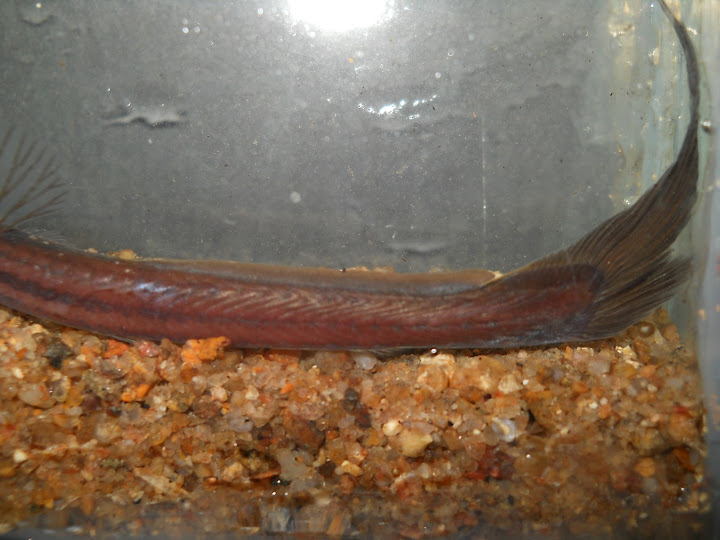
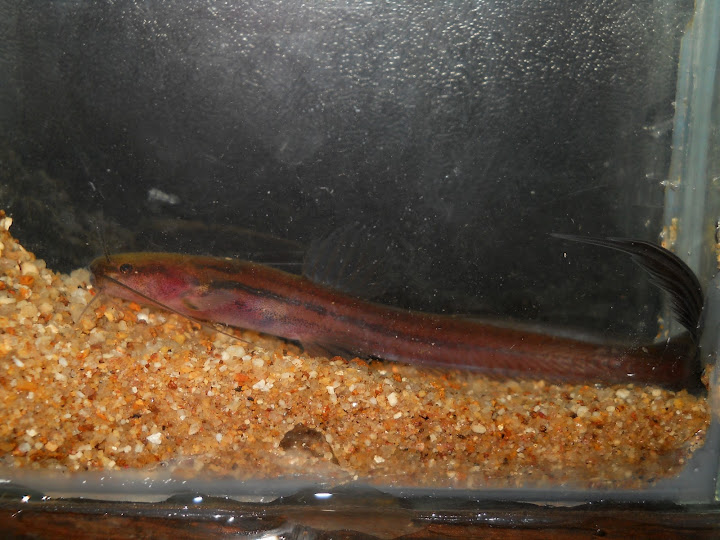
The specimens I received as
O.longicaudata seemed to have longer upper caudal lobes. Even specimens of 2 " SL had very long upper caudal lobes.







